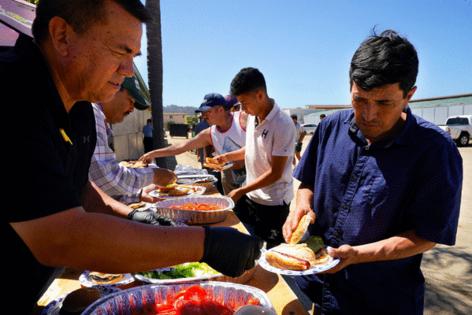Bryce Miller: Del Mar chaplain Eli Hernandez sees people in the racing shadows
Published in Horse Racing
DEL MAR, Calif. — Eli Hernandez was 35 and working as a drug and alcohol counselor in east Los Angeles, trying to help the homeless and those with mental health issues untangle lives that had become suffocating, bear-hugging kids from loveless homes being drawn into gangs, when he got the call.
The voice on the end shook his world to its core.
“He’s dead, he’s gone,” Hernandez quietly recalled. “They found him on the street.”
Hernandez’s 26-year-old nephew, caught in that powerful and dangerous swirl, had overdosed on heroin.
“That’s when I said, ‘Something has to be done,’ ” he said.
As the memory moistened his eyes Tuesday outside a dining hall on the backstretch of Del Mar racetrack, workers streamed through a line for an annual free barbecue that Hernandez organizes.
The path he diligently has walked since that gutting call, including his last six years as chaplain at the seaside track, has made him irreplaceable glue for so many rolling up sleeves in the morning darkness to make this place run before the horses do.
The blend of faith and fundamental respect earns trust through genuine connections and a tireless commitment to finding solutions to the obstacles that trip up so many.
He’s a do-something force. Again, again and again.
The workers take care of the horses. Hernandez and the group he has gathered around him take care of them.
In a time where divisiveness can seemingly rule the day, the chaplain’s compassion and caring create community among the hay and hard work.
“He’s always there,” trainer Joe Herrick said.
This is the side of horse racing the public rarely sees. Money and fame populate the front porch of the sport. Animal-rights activists circle the entrance gates. The spotlight tightens there.
Here, on the opposite side, people earn the most honest of dollars away from the noise, put kids through school and understand that bigger tomorrows live in the shadows, too.
Hernandez offers a hand and barn-sized heart.
“He does it with such a light spirit,” said Gail Matthews, who has operated Winning Hands Equine Massage Therapy since 1999. “Everyone trusts him. He radiates such an easy-going kind of love. He makes sure (nobody) feels indebted. He gives so much joy.”
All someone needs to do is walk to the closest barn as the burgers and hot dogs sizzle on two large grills.
Trainer Anthony Saavedra tells the story of one of his workers, Cesar. He began drinking heavily, trying to drown relentless demons.
First, the footing becomes tricky. Soon, like too many, the earth crumbled completely.
“Cesar got into some bad times,” Saavedra said. “Before he knew it, he was a full-blown alcoholic. In the rigors of life, a lot of people think tequila is the only solution.”
Cesar began to show up drunk at work. Saavedra had to let him go.
A light switch flipped.
“I didn’t want to be out on the street with no job,” said Cesar, as Saavedra translated.
Without Hernandez?
“Either on the street or dead,” Cesar said.
The chaplain heard. The two connected. Healing began.
“Once he decided he was ready for help, Eli took it from there,” said Saavedra, who later hired Cesar back. “Eli was persistent and didn’t weaken. He kept checking in with him. Now he’s been sober three years and four months. He got married. He became a citizen. He still goes to meetings.
“It’s such a good feeling.”
Cesar smiled. That’s easier to do now.
Hernandez is the driving force behind the barbecue, along with a yearly backpack giveaway to the children of workers. Between the two initiatives, the group he leads spends nearly $4,000 gathered through donations and crossed fingers.
Three times a week, he offers workers rides to visit the grocery store, bank or wherever is needed. He recruited an immigration lawyer to help with paralyzing paperwork.
At Santa Anita, a track many of the workers also work out of, Hernandez puts out tables with produce and fruit, breads and cakes.
Wearing a buttoned-down shirt or “Texas Chainsaw Massacre” T-shirt, out-of-the-box hat or distressed tennis shoes, as those in the food line wore, was immaterial.
Need has no wardrobe.
“I wake up every day and think, I don’t have to do this. I get to do this,” Hernandez said. “That’s everything. A lot of times, they don’t have a voice. If I can help, if I can make that phone call, let’s do it.
“The message is, the door is open and our hearts are open. How can we help?”
One lunch for about 325 people is simply a snapshot.
Hernandez, who turns 61 on Monday, has made his life’s work clearing the fog and mending others.
“We want them to know they matter, they’re appreciated,” he said.
For Hernandez, it starts with a hamburger and a smile.
Where it goes from there, that’s the magical part.
©2024 The San Diego Union-Tribune. Visit sandiegouniontribune.com. Distributed by Tribune Content Agency, LLC.







Comments